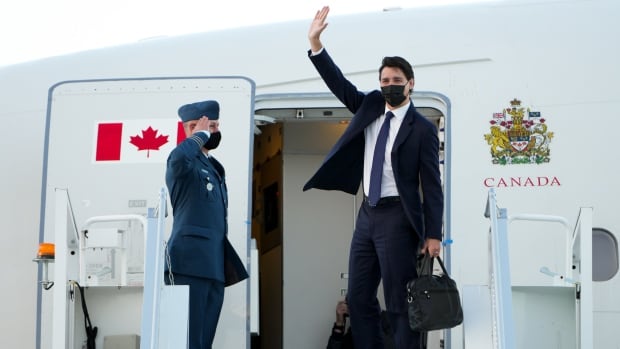
Prime Minister Justin Trudeau is heading to Europe for a busy six-day trip during which he’ll talk about COVID-19, the economy, and climate change.
His first stop will be in the Netherlands, where he will address the Dutch parliament Friday and meet with his counterpart.
He will then travel to Rome for the first in-person gathering of G20 leaders in two years.
“And we’re off. We’re heading overseas to work with our partners and focus on strengthening trade, creating jobs, and leading the global fight against climate change,” a post on the prime minister’s Twitter read Thursday morning.
And we’re off. We’re heading overseas to work with our partners and focus on strengthening trade, creating jobs, and leading the global fight against climate change – check back later for updates from the Netherlands, the @G20org, and @COP26. pic.twitter.com/ghpwpO5HbS
— Justin Trudeau (@JustinTrudeau) October 28, 2021
He’ll also go to Glasgow, Scotland for climate talks at the UN Climate Change Conference of the Parties (COP26), which brings together world leaders to renew their countries’ climate targets starting Sunday
The summit was delayed last year due to the pandemic.
“The commitments laid out in Paris did not come close to limiting global warming to 1.5 degrees, and the window for achieving this is closing. The decade out to 2030 will be crucial,” the summit org
Can Canada meet its Paris Agreement target?
The Clean Prosperity analysis says all of Trudeau’s recent climate policies could get Canada’s emissions to 41 per cent below what they were in 2005, by 2030.
That’s just within reach of the new 40 to 45 per cent target he set last spring.
“The extent of emissions reductions within that 37%-41% range is dependent on fossil fuel prices and their impact on oil and gas production. If fossil fuel prices remain relatively high, emissions will be reduced by 37%; but if prices and production are lower, our projections show that the LPC will slightly exceed the lower bound of the 2030 target,” the report said.
Canada’s emissions have risen more than three per cent since 2016, the most of any G7 nation.
New figures from Oil Change International say Canadian fossil fuel producers receive more public financial support than any in the developed world.
The report, which includes 2019 and 2020, adds up loans, loan guarantees, grants, share purchases and insurance coverage provided to fossil fuel producers by governments, government agencies and government-owned multinational development banks.
Around the world, that added up to almost $78 billion last year — down from the 2015-2017 average of $111 billion.
Canada topped the list, providing almost $14 billion a year between 2018 and 2020.






